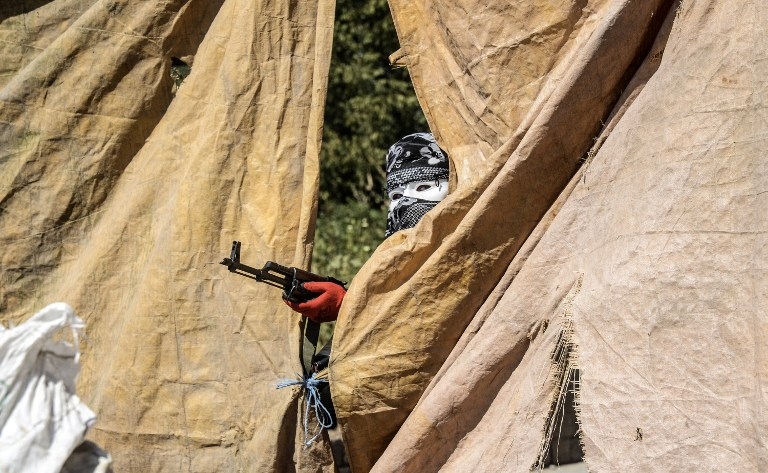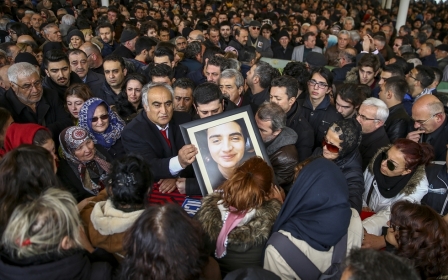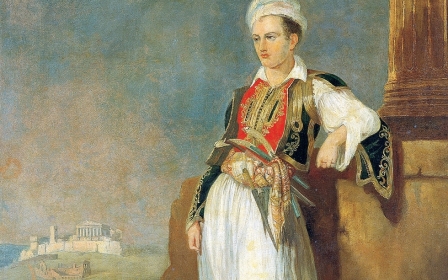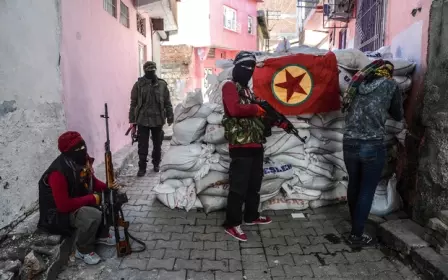Resolving Turkey's Kurdish problem requires adopting a new vision

Mustafa Ismet (1884-1973) is considered to be the second most important figure in the Turkish Republic. Ismet graduated from the Ottoman Military College in 1903. He joined the Committee of Union and Progress (CUP), fought in the two Balkans wars and led the Ottoman troops in the Beersheba front in Palestine during the First World War and in the battle of Nablus (19-25 September 1918).
It is believed that the friendship between Ismet, later Inonu, and Mustafa Kemal, later Ataturk (1881-1938), started when the latter commandeered the Ottoman army in Syria and Palestine in the last months of the war. Following defeat in the battle of Nablus against Allenby’s troops, Ismet was transferred to the position of general secretary of the War Ministry, where he worked until the British occupied the Ottoman capital in March 1920.
Ismet left Istanbul in order to join the troops of the Grand National Assembly, which launched the war of independence under the leadership of Mustafa Kemal months before he arrived in Ankara, where he was appointed chief of staff of the National Assembly troops and commander of the Western Front. Soon afterwards, Ismet became one of the heroes of the war of independence after he accomplished the first victory for Ankara in the first battle of Inonu (9-11 January 1921).
Ismet Pasha led the negotiations for the Mudanya Armistice Treaty and then the Ankara delegation for the Lausanne negotiations in 1922, which ended with the Allies’ recognition of Turkey’s independence within the borders of what remained of the Ottoman Sultanate on the eve of Istanbul’s signing of the Armistice of Mudros in the autumn of 1918.
After the declaration of the republic, Ismet was chosen to head the government twice during the presidency of Mustafa Kemal. He returned once more to head the government in the aftermath of the 1960 coup, and is therefore considered to be the politician with the longest time served as prime minister of the Turkish Republic.
In 1934 Ismet chose Inonu, the site of his first great victory, to be his family name. And in 1938 he was elected to succeed Mustafa Kemal as president of the republic. He continued to serve in that position until his party, the People’s Republican Party (CHP), lost in the elections of 1950, the first free multi-party parliamentary election. Ismet Inonu was seen, whether in terms of his several premiership positions or in terms of his long-term serving as president of the republic, as one of the founding fathers of modern Turkey and one of its major guardians.
This is the republic that was meant right from the start to be a state – a nation in the Western concept of the modern nation-state. The years of his own presidency of the republic might have exposed a more extreme inclination than that of Ataturk himself when it comes to consolidating the Turkish nationalist foundations of the state on the land and the people, and in terms of pursuing the policy of the Turkish melting pot.
The paradox here is that the nation state, the protection of which Ismet Inonu dedicated his life, relied more on an imaginary Turkish nationality than on a racial and ethnic reality. There is no more embodiment of the construction of the Turkish nationalist idea than Ismet Pasha himself, who was not a pure Turk. Although there is a dispute as to whether his mother was of Turkish or Kurdish ethnic roots, there is no doubt whatsoever that his father was a Kurd from the city of Malatya, which chose to erect a statue of Ismet Inonu in the middle of its central square in an expression of pride and in commemoration by the city of one of its most prominent sons.
And this issue of ancestry and Turkish identity does not end with Ismet Inonu. Mustafa Bulent Ecevit (1925-2006), who assumed the leadership of the People’s Republican Party after Inonu, and who headed the Turkish government four times between 1974 and 2002 was born to a father of Kurdish origin and a mother of Bosnian roots. Turgut Özal (1927-1993), the minister and then prime minister in the aftermath of the 1980 coup, and then the president of the republic, was also of mixed Kurdish and Turkish ancestries.
As Michael E Meeker states in the title of his anthropological study of the Black Sea coastal society, Turkey is a “Nation of Empire”. The nationalist nation, in contrast, was invented by the founder of the republic in the early 1920s; and imposed by the power of the state on a population that had Turkish, Kurdish, Circassian and Arab roots as well as a number of other small ethnicities.
This did not only apply to Turkey, but it applied to the majority of the states of the Arab and Islamic world, including Iraq and Syria. All of these happen to be pluralistic peoples; it would rather difficult to place them all in the template of a single one-dimensional state. Despite the domination of one ethnic or religious community in the states of the Middle East, whether Arab, Turkish or Persian, and Islamic Sunni, the history of socio-politics in these states, their ethnic and doctrinal plurality, renders it difficult for their peoples to coexist with the central nation-state system that is of European origin. There is no doubt that the winds of the Arab revolution, which have been rocking the cities and towns of the Middle East for the past five years, have rendered fully open the file of the state in the region.
Today, Turkey and its neighbourhood are living through a new phase of the conflict between the Kurdish nationalist groups, especially the Kurdistan Workers Party (PKK), on the one hand, and the Turkish state and society on the other, including the society in the areas where a Kurdish majority exists. After several years of truce, and despite the fact that the state had gone forward in finding a final solution, cultural, economic and political, for the Kurdish problem and in putting an end to the marginalisation of the south-eastern part of the country, the PKK violated the truce in the summer of last year.
In the weeks that followed the breach of the ceasefire, it became obvious that the PKK was embroiled in a process of great deception against the state and the people. Instead of withdrawing the arms and the armed men from the cities and towns, the PKK exploited the years of peace and tranquillity in order to stockpile more weapons. As on many previous occasions, the leaders of the PKK in Iraq's Qandil mountains made a strategic mistake when they thought that the indecisive elections of June 2015 would render Ankara more vulnerable and more willing to succumb to the blackmail of their violence.
However, the government of Ahmet Davutoglu stood up to the PKK violence and confronted it with equal force. On 26 October, the leaders of the PKK in Qandil mountains escalated the policy of armed violence against Ankara when they ordered the supporters of their party to entrench themselves inside Kurdish majority districts and towns and to declare autonomy.
In this round of conflict, hundreds of soldiers, policemen and civilians lost their lives in addition to thousands of PKK elements. But it is obvious, in any case, that the Turkish state has inflicted a heavy defeat on the PKK. There is nothing more indicative of the outcome of this round of conflict than the amazing popular reception given to the Turkish Prime Minister during his visit to Diyarbakir, whose population is of an overwhelming Kurdish majority, on 31 March.
Despite all the exaggeration that surrounds the Kurdish problem in Turkey and its neighbourhood, and the attempt by some superpowers to use the Kurdish card in order to pressure Ankara and blackmail it, a huge part of the Kurdish electoral vote still goes to the ruling Justice and Development Party (AK Party). The AK Party’s parliamentary bloc contains the largest number of Kurdish members of parliament.
Yet, defeating the PKK should not be seen as the end of the road. The problem with the PKK and the Kurdish radical nationalist groups as a whole is that they adopt the Western model of the state for the Middle East as if this is the sole solution for the Kurdish problem. Just like the Arab and Turkish radical nationalists, the Kurdish nationalists assume that the post First World War state in the Middle East was the ideal model for the state. Yet, the people express doubt, almost on a daily basis, about the legitimacy of this state.
In contrast, the PKK behaves as if the post First World War state is heaven on earth and the sole path to salvation. Such state ideology is what ought to be confronted and even defeated. Ultimately, and no matter for how long this conflict drags on, there is no solution for the Kurdish problem without constructing a new political future and a different regional regime, for the entire Middle East.
- Basheer Nafi is a senior research fellow at Al Jazeera Centre for Studies.
The views expressed in this article belong to the author and do not necessarily reflect the editorial policy of Middle East Eye.
Photo: An armed Kurdish militant of the Kurdistan Workers' Party (PKK) wearing a mask and a scarf covering his head aims his weapon from behind a barricade of concrete blocks, on 28 September, 2015, at Bismil, in Diyarbakir (AFP).
New MEE newsletter: Jerusalem Dispatch
Sign up to get the latest insights and analysis on Israel-Palestine, alongside Turkey Unpacked and other MEE newsletters
Middle East Eye delivers independent and unrivalled coverage and analysis of the Middle East, North Africa and beyond. To learn more about republishing this content and the associated fees, please fill out this form. More about MEE can be found here.





